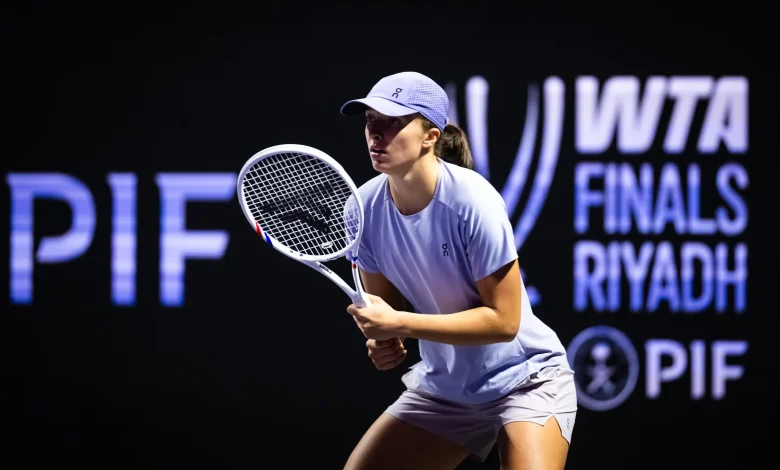WTA Finals Day 1 preview: Swiatek opens against Keys as season finale begins in Riyadh

The WTA Finals kicks off on Nov. 1 with a pair of singles matches from the Serena Williams Group and a pair of doubles matches from the Martina Navratilova Group.
Before getting into the matches, here’s a little refresher on the rules of the year-end tournament in Riyadh: The top eight singles players and top eight doubles teams are split into two groups of four, and each player (and team) plays the other three players (and teams) in their group.
WTA
Each round-robin win is worth three points. If players (or teams) are tied at the conclusion of the group stage, the head-to-head winner advances. If there is a three-way tie, the tiebreaker is determined by matches played, total sets won and total games won.
The top two singles players (and teams) from each group advance to their respective semifinals, where the group winners take on the second-place finishers from the opposing group.
The semifinals and finals are single elimination.
Alright, let’s get into it.
The Matches
Note: All matches are local time.
Sara Errani and Jasmine Paolini (1) vs. Asia Muhammad and Demi Schuurs (8) – 3:30 p.m.
The top doubles team in the land gets first billing in Riyadh on Day 1. Top-ranked Paolini and Errani, who took home four titles in 2025 — including the French Open — actually lost to Muhammad and Schuurs earlier in the year, a convincing 6-4, 6-0 defeat in Indian Wells.
They met again in the quarterfinals of the US Open, and this time the Italians got it done 6-1, 7-6 (5).
WTA
Iga Swiatek (2) vs. Madison Keys (7) – Not before 6 p.m.
Head-to-Head: Swiatek leads 5-2
The Case for Swiatek: It doesn’t take much to make a case for Swiatek, a six-time Grand Slam champion and already one of the best of all time, but we’ll do it anyway.
The World No. 2 has ample WTA Finals experience. This will be her fifth time playing the year-end tournament, and she reached the semifinals in 2022 and won it all in 2023. She’s also had success against Keys, most recently coming from behind to beat the American 0-6, 6-3, 6-2 in the Madrid quarterfinals back in April.
Swiatek also figures to be sharper. She played a healthy Asian schedule, whereas Keys hasn’t taken the court for a match in over two months.
The Case for Keys: Maybe all that time away will have her feeling rested and recharged? It’s certainly possible.
It will be interesting to see how the 30-year-old comes out of the gate after not having played since losing in the first round of the US Open.
And even though Keys trails the head-to-head series, she actually holds a 2-1 career advantage on hard courts. That second win came earlier this year, in one of the biggest wins of Keys’ career. Seeded seventeen spots lower than Swiatek, Keys rallied for a 5-7, 6-1, 7-6 (8) win in the Australian Open semifinals. We all know what happened next.
Amanda Anisimova (4) vs. Elena Rybakina (6), to follow
Head-to-Head: Never Played
The Case for Anisimova: There’s nothing to draw from here in regard to past matchups, but Anisimova is riding high after the year of her career. She won a pair of WTA 1000 titles in Doha and Beijing and added a couple of Grand Slam finals, vaulting into the Top 5.
Her resilience at the US Open, beating Swiatek in the quarterfinals and reaching the final after her 6-0, 6-0 loss in the Wimbledon final, proves that no stage is too big for her. She’s the lone debutant in this year’s field, but she won’t be phased. She’ll be ready.
The Case for Rybakina: Rybakina comes in with plenty of momentum of her own after improbably qualifying for the Finals. She needed to rattle off six consecutive wins to punch her ticket, and she did just that in Ningbo (where she won the title) and Osaka, including wins over fellow Top 10 players Jasmine Paolini and Ekaterina Alexandrova. She did pull out of her Japan Open semifinal with back pain, so that’s something to monitor and keep an eye on.
With 468 aces this year — 95 more than Linda Noskova, who has the second-most — Rybakina’s serve can carry her past anyone.
Veronika Kudermetova and Elise Mertens (4) vs. Hsieh Su-Wei and Jelena Ostapenko (6)
Kudermetova and Mertens have had plenty of success against Hsieh and Ostapenko in 2025, most notably in the Wimbledon final, where they came from a set down to win 3-6, 6-2, 6-4. Earlier in the year, in Rome, Kudermetova and Mertens beat Hsieh and Ostapenko 7-5, 6-2. This will be their first matchup on hard courts in 2025.




